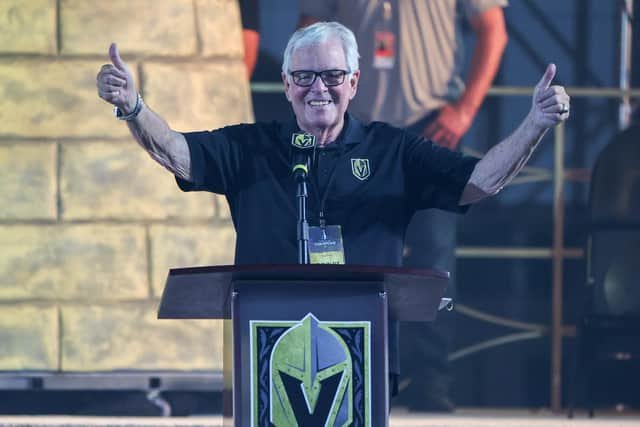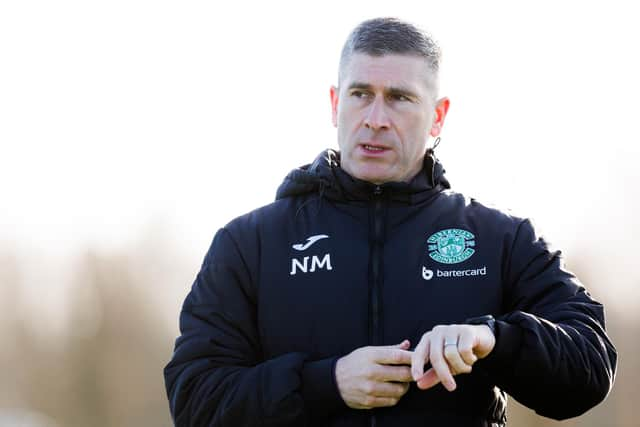Hibs' Bill Foley green light gives cheat code in Hearts and Aberdeen battle - and could have repercussions on Scottish game
The announcement that Hibs have been given the green light by the Scottish Football Association to proceed with investment from American billionaire Bill Foley could have game-changing consequences for the Easter Road club – and Scottish football as a whole.
After Hibs made their case to the SFA board last month at Hampden – and in meetings thereafter – the governing body has approved the dual interest dispensation request to allow Foley to have a sizeable minority shareholding in the capital outfit. One final hurdle needs to be cleared by Hibs, when they seek shareholder ratification at its annual general meeting. An exact date for the AGM has yet to be announced, but it will take place in February and Hibs do not expect any problems in getting their last rubber stamp.
Advertisement
Hide AdAdvertisement
Hide AdBlack Knight Football Club was established by Foley, a 79-year-old Texan businessman and former attorney, and is the owner of English Premier League club Bournemouth as well as NHL ice hockey team Vegas Golden Knights. Foley also has a significant minority stake in French Ligue 1 outfit Lorient and has set up a new A-League side in Auckland, New Zealand, which will be competing come the 2024/25 season.


Black Knight is expected to invest in the region of £6 million into Hibs, which will be used for infrastructural improvements – such as indoor training facilities and stadium alterations – as well as plumping up manager Nick Montgomery’s summer transfer kitty. While new signings have been made in the current transfer window, such as Myziane Maolida, Emiliano Marcondes and Nathan Moriah-Welsh, Hibs have hardly gone on a spending splurge, with Montgomery consistently stating that there has only been a modest budget for this window. The Bournemouth link to the latter two signings will raise eyebrows and Foley’s potential involvement has likely helped smoothed Moriah-Welsh’s arrival and the imminent loan signing of Welsh defender Owen Bevan from the Cherries. Marcondes has long been on Hibs’ radar and could have arrived sooner had injury not got in the way.
The investment gives Hibs a few avenues to explore in terms of recruitment. The direct links to Bournemouth, Lorient and Auckland will undoubtedly see players move between the clubs. Hibs are essentially going to become part of a chain. A promising prospect that they could not afford could be loaned to them for a season. But the investment also gives them more money to spend in the summer. Barring a cataclysmic collapse in Premiership form (Hibs are currently sixth), the board will be right behind Montgomery and his vision, and will back him accordingly in the next transfer window to assemble his own team.
What the £6m investment will do is allow Hibs – financially at least – to bridge the gap with Edinburgh rivals Hearts and Aberdeen. The Jambos and the Dons have both been involved in group-stage European football in the past two seasons via the Europa Conference League. With Hearts currently occupying third place and a whopping 16 points clear of Hibs right now, it would take a seismic shift in fortunes for Montgomery’s men to overhaul them. Winning the Scottish Cup is realistically the only way Hibs can land the golden ticket through organic means that Hearts and Aberdeen have enjoyed. Club accounts show that Hibs’ rivals have enjoyed revenues anywhere between £5-7m from their European runs, which is why the amount of money Foley plans to invest is important: it is essentially a cheat code for Hibs – currently with the fifth largest budget in the league – to restore financial parity with their principal competitors for third place.
The key for Hibs will be to spend the money wisely. Recruitment has improved since the experienced Brian McDermott was given the director of football role last year, but in the recent past too much money has been frittered away on sub-standard signings. The training ground improvements will make the environment for players more attractive when they look around, with Aberdeen and Hearts both having the use of excellent facilities.


What is the trade-off for Hibs? The dilution of shares for the existing holders, not least fan group HSL, could be concerning for some, plus the fact that a once proudly Edinburgh-owned club is now in the hands of investors from the States and beyond. The Gordon family have unswervingly backed Hibs since the now deceased Ron Gordon took over in 2019 and his son, Ian, and his widow Kit have reaffirmed their commitment to Hibs even with Foley’s interest. But will £6m be enough to make a tangible difference to fortunes on the playing field? Hibs have hardly been serial third-place finishers, or Scottish Cup winners, and while a levelling of the financial playing field with Hearts and Aberdeen will help, there will be an expectation from supporters of Hibs to get it right next season.
Other clubs in Scotland will surely be watching this development with interest, too. Dundee have just launched a partnership with English Premier League club Burnley and its owners, while most top-flight entities have been tapped up for potential investment from abroad. The landmark relaxing of the dual interest role is sure to pique interest from investors who have been waiting in the wings to swoop.
The fact that a lot of clubs require such moves to be a competitive force is perhaps a lamentable development, but it is a reminder where Scottish football sits in the current global landscape. It’s rare to have a mobilised fan owner such as the Foundation of Hearts – borne out of near extinction for the Tynecastle outfit in 2013 – nor have a benefactor as generous as the Jambos do with James Anderson to generate extra revenue. Hibs will hope that Foley’s pending arrival will give them a taste of the European adventures that their city rivals, and Aberdeen, have experienced recently.
